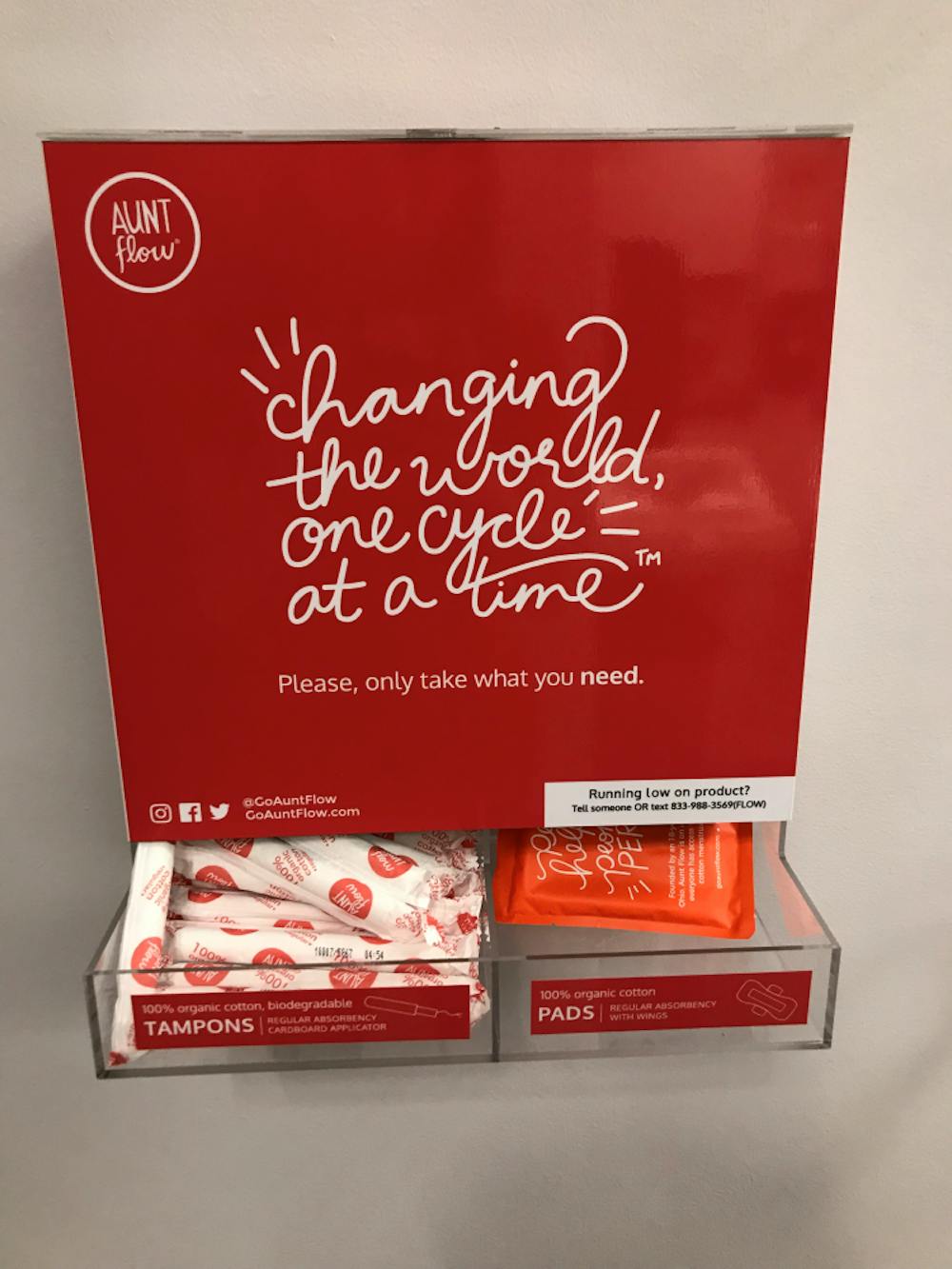Free menstrual products are now supplied in campus bathrooms, marking the implementation of the Menstrual Products Task Force’s initiative, which was approved by University administrators last semester.
A total of 56 bathrooms in seven buildings on campus, including Frick Chemistry Lab and the Friend Center, have been stocked with free menstrual products. The menstrual products can be found in men’s, women’s, and gender-neutral bathrooms.
The Menstrual Products Task Force, a group of students associated with the University Student Government, hopes that this initiative will help students maintain healthier lifestyles without the cost of menstrual products becoming a burden.
The bathrooms in question now feature products from Aunt Flow, an environmentally friendly menstrual products start-up. Each bathroom is equipped with an Aunt Flow dispenser attached to the wall that is stocked with biodegradable pads and tampons.
Some students have expressed appreciation for the selection of Aunt Flow products.
“When I walked to the bathroom last week and I saw them, I was really excited … to see that they are organic and biodegradable,” Naomi Cohen-Shields ’20 said.
Cohen-Shields also expressed support of the gender-inclusive reach of the implementation.
“I think the University should strive to be as inclusive as possible and understanding of different people’s genders and understandings of themselves, so why not make them available to anyone who might need them?” she asked.
Preeti Iyer ’20, leader of the Menstrual Products Task Force, has already received positive feedback and is hoping to hear more from students about what they like and dislike about the products.
“It’s been really cool just to see on social media people posting about it, the reactions, the usage of it,” Iyer said. “It’s definitely been pretty inspiring to see how the campus has reacted.”
According to Iyer, the initiative has faced some challenges in its first few weeks. She expected these obstacles, especially given the intentional inclusion of women’s, men’s, and gender-neutral bathrooms as sites of the new product dispensers.
“We have had some issues with vandalism in the men’s bathroom in First, which is a little disappointing,” Iyer said. “But we do hope that over time as people recognize this and know that this is a program that’s here to stay, those will stop and people will be respectful of our mission and goal for those who do need these products.”

John Argento, Operations Manager at Building Services, serves as a liaison between the student taskforce and building services. He supervised the installment of the dispensers in campus restrooms and helped Iyer print laminated informational posters to hang alongside the dispensers. Argento corroborated that there was some abnormal treatment of the dispenser in the men’s restroom in Frist Campus Center.
“The supervisor from Building Services from Frist approached me when I was waiting to meet Preeti and he let me know that … in one of the men’s rooms the products were all removed,” Argento said. “No idea what happened, who or why, just know apparently all the products were taken out of it.”
In his role as liaison to the Menstrual Products Taskforce, Argento has been an avid supporter of the implementation.
“I think it’s a great initiative,” Argento said. “I think it’s going to help some maybe underprivileged people who cannot afford to buy their own products.”
When asked how the implementation would affect Building Services, Argento explained that it should not add any significant burden.
“I don’t think it’ll make that much of a difference to us,” he said. “It’s just a matter of restocking them as needed, checking them every day, like restocking any other item like toilet paper, paper towels, soap — just takes an extra three seconds for our custodians to do it.”
According to Iyer, while the initiative started as a student-led effort for the sake of improving student life, she sees it expanding to become a larger campus effort. Many staff members have reached out to her, hoping to get involved. Iyer hopes to incorporate their perspectives to help expand the initiative with a second stage implementation in the future.
“[We hope to work with] a little more staff, a little more diversity of the University population, instead of just students, to understand how this could benefit everyone,” Iyer said. “Then, hopefully, laying some of that financial and policy understanding, so hopefully next year we could do a second-wave implementation.”
While the past few weeks have served as the first-stage implementation following a pilot program in 2017, Iyer does not take for granted that the initiative will get approval to continue and expand.
“I think in the administration's mind, this was still a little bit more of a pilot program, so they really want to see that there is support for this, that this should be prioritized on their agenda and their budget as much as other initiatives that they are prioritizing,” Iyer said. “That really comes from the student engagement and support of this initiative.”









